Managing Editor’s Corner
August 19, 2011 by Patrick David Heery[wpcol_1half id=”” class=”” style=””]Take a walk through any American city and you will discover a wide range of sites: gated mansions; cardboard boxes masquerading as homes; children with private tutors and crowded classrooms with decades-old textbooks; factories that produce energy and goods for one neighborhood while dumping toxic waste into the water supply of another; prisons that “warehouse” one out of every hundred American citizens; and yes… vacant churches located in “unwanted” neighborhoods, and even more churches struggling to be “relevant.”

The church grew up in such times—long ago. Those were the days of empire, of military occupation, a great swath of poor people ruled by the rich “noble” few, when status dictated value and even humanity. Small, often underground, bands of people met to break bread together, to worship, to share in common all that they had. These were no ideal communities: they were divided by class strife, predictable human imperfection, and debates over identity and inclusion. But interestingly, they chose the unwanted neighborhoods. And their message was already relevant because it was a message of empowerment to the powerless, an offering of community to the isolated—because it was a message they lived.
The church need look no further for its relevance. Who owns this economy? It is not the corporations, or our political representatives, or an army of bureaucrats, or even we as autonomous individuals. The economy—literally, the law of the house—belongs to God… and to us, in as much as we collectively participate in God’s ordered community. This is no idyllic abstraction. Hebrew scripture records that God laid down Sabbath (Shabbat) laws to prevent the concentration of too much wealth and property in the hands of too few. Through practical regulatory policies, the Israelites sought to orient their economy toward a single owner: God. As long as the land, wealth, health, and even the people’s lives belonged to God, they had to be shared equitably, fostered and cared for, and never permanently enslaved.
The economy is just people, just a collection of practices and preferences, a set of commonly accepted rules and mores. It is just a house. If we do not like the house, if the laws of the house no longer accord with justice, then we rebuild.
The Economic Crisis: A Land of Inopportunity
The year 2008 unleashed an economic crisis on the United States and thereby the world, the likes of which had not been seen since the Great Depression of 1929. The crisis grew out of economic and social mismanagement beginning in the late 1970s marked by the exponential increase in the gap between rich and poor, the vast reduction of taxes for the top holders of wealth, a fantasy policy of deregulation, increasing debt and trade deficits, the export of industrial jobs beyond American borders, the proliferation of derivatives, and the creation of a “mortgage bubble” in the housing market. The economic crisis has brought vast under- and unemployment, foreclosure, huge bail-outs at cost to the tax-payer, and increasingly despairing living conditions that disproportionately affect people of color and urban communities. In the meantime, environmental degradation, incarceration, the mismanagement of public spending, rampant consumerism, and unhealthy, unsustainable living (with signs of obesity and the production of vast amounts of waste) all continue unabated.
But of course, it must be confessed that the hard times which have hit the American middle-class (what we are calling the “Dark Night of the American Economy”) are not new to the majority of human beings living on this planet. Populations across the world and within the United States have long existed in conditions of marginalization, bare subsistence, and frustration. The American economic crisis has only exacerbated what was already a desperate situation for millions, if not billions.
Enter the church. Our gospel responsibility is clear: we are to care for the poor and to proclaim liberty to the captive. It has often been less clear for many Christians whether this command extends beyond charity (which attends to immediate needs and symptoms) to political action (which addresses systemic political, cultural, and economic causes). For some, it is even less clear how Christians should—or even if they can—go about such work of mission and transformation. For many, a feeling of powerlessness, of being trapped by overwhelming and invincible forces, has become a common ailment. Such powerlessness has resulted in numerous individuals and congregations that settle for an insular, “spiritual” faith-existence, or celebrate self-congratulatory acts of charity that do not threaten established lifestyles or political systems.
The Inaugural Issue of Unbound
The inaugural issue of Unbound: An Interactive Journal of Christian Social Justice tracks the church’s history of both complicity and active resistance to economic exploitation and inequality. Too many of us have become dislodged from our past, isolated and without a narrative. But memory is power. It is hope. It is leverage. A future requires a past.
So, as we envision and re-member a way forward, it is our hope that each of us might know an embodied experience of God’s grace that empowers us to take concrete (informed) action and risk. While economic analysis is necessary for identifying causes and holding people and institutions accountable, our reading of scripture finds in the prophets a call to do, and perhaps more importantly, be something new.
The words of the LORD in Isaiah resonate still today: “See, the former things have come to pass, and new things I now declare” (Isaiah 42:9, NRSV)… “Be glad and rejoice forever in what I am creating… the sound of weeping and crying will be heard no more” (Isa. 65:18-19).[/wpcol_1half] [wpcol_1half_end id=”” class=”” style=””]Economic Power, Found
Isaiah speaks in order (1) to give hope, (2) to identify the locus of all true power—God, and (3) to offer a people, should they be obedient, an opportunity to share in that creative power. That power is both a blessing and a responsibility. Socio-economically, of course, we have power. We have the power to buy, or not to buy. We have the power to change the ethical commitments of the largest corporations in the world—simply by refusing to purchase from them.[i] With every purchase, every piece of clothing, every food-stuff, we cast a vote for the kind of economic system we want. Democratically, we too have power. Despite unlimited corporate campaign contributions, we still have the power to elect representatives. We have the power to unite as communities and agents for social change: to march, to boycott, to demand justice, to exercise civil disobedience and freedom of speech, and to examine critically the dominant systems of thought and institution. But deeper than all of these powers is the strength that comes from walking with, and in, God.
What kind of power, one might ask, do the followers of the Nazarene have? What kind of power belongs to a poor man hanging on a cross, a common criminal executed by the state, in some remote area of the world, impoverished and of little concern to the “important”? It is the same kind of cynical—but understandable—question that is posed when someone inquires just how much power really belongs, for instance, to the person holding down several minimum-wage jobs only to come home exhausted, with no time, let alone energy, for a social movement.
It is an understandable question, even a good question. And yes, this is where faith comes in, but it is not a disembodied faith—not a “just keep your head low and pray for heaven” faith. No, it is a faith with real and tangible consequences for our lives today. It is as tangible as the wounds on the resurrected Christ’s hands and feet. It is as real as citizens coming together in Ann Arbor, Michigan, and organizing to establish low-income housing.[ii]
So what kind of power belongs to the exhausted, overworked woman who has children to feed and bills to pay? The same power that gets her up every day when even her bones creak. The same power that enables her to walk her children to the bus stop a mile away. The same power that takes her to church on the one morning she could sleep in. Instead of looking at the politically marginalized and seeing hopeless victims, perhaps we should take a cue from the gospel and realize that sometimes the greatest strength resides in the battered, the imprisoned, the crucified.
None of this means that confronting entrenched powers is easy. Political powerlessness and enforced disenfranchisement are a reality. We have an unequal system. But the present economic crisis did not just fall out of the sky. If we have a consumer economy, we are the consumers who produced it. The effective use of our power requires, first, that we recognize we have it.
I am talking about a fundamental paradigm shift. Many of us go to church or enter the voting booth in the much the same way as we walk through the sliding doors of our local mall. We are there to shop; not to produce, not to contribute, but to consume. We fashion ourselves passive recipients of prepared products, empowered at best with a choice between brands of laundry detergent. But the church does not exist chiefly to offer a product. The same can be said for our democracy and even our economy. These three inter-connected realms of engagement (the religious, the political, and the economic) should, on the contrary, be constituted in a community of mutual ownership, agency, and shared creation, for the chief purposes of collective wellbeing and service.
To create that community and accomplish this shift in our most essential thinking and behavioral patterns, we have to get smart. Real change, contrary to popular myth, is not achieved through spontaneous uprising or charismatic personalities. It is achieved by hard work, getting down in the trenches, thinking strategically and critically, building public trust, altering our buying practices, mobilizing as a community, and listening hard to one another and to God.
These and more are our powers and capabilities. But they do not reside on our shoulders alone. It is not up to us to save the world. Christ has already done that. It is merely ours to live as if the world were once again good and right—to live out the love and grace (and their radical ethical implications) that are already ours.
So whose house, whose economy, is this? It is God’s—and by extension, ours. And should anyone forget this singular truth, it is our responsibility to remind them. And remind them, we shall.
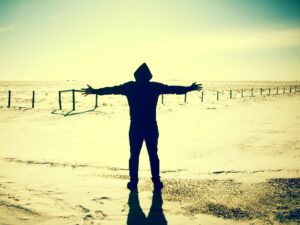
Notes
[i] Admittedly, purchasing power is highly limited for those beneath or around the poverty line. Sometimes the cheap, though unethically produced, goods are all that one can afford or even reach. What this means is that, in addition to being careful in judgment, those who occupy social locations of greater privilege have also greater purchasing responsibility; and that we as a community must explore alternative and/or more strategic forms of influence for those with limited economic means. History is full of precedents, including the bus boycotts of the Civil Rights Movement in the United States.
[ii] See this issue’s article, Nile Harper, “Religious Action for Affordable Housing: Creating Community.”
[/wpcol_1half_end]

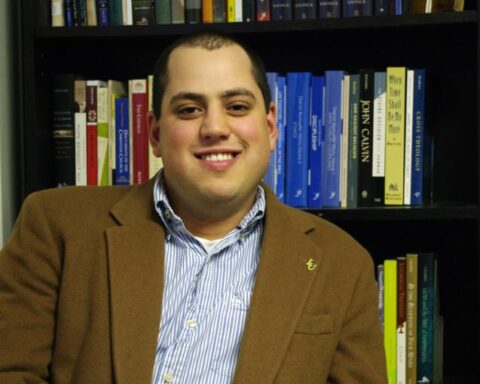
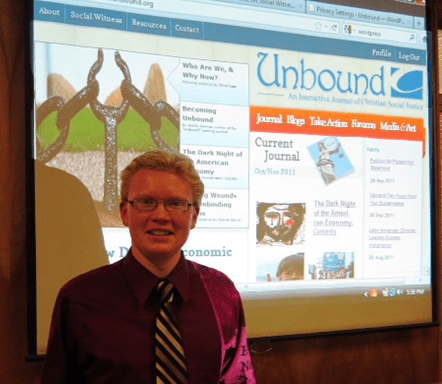
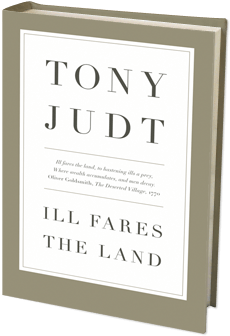
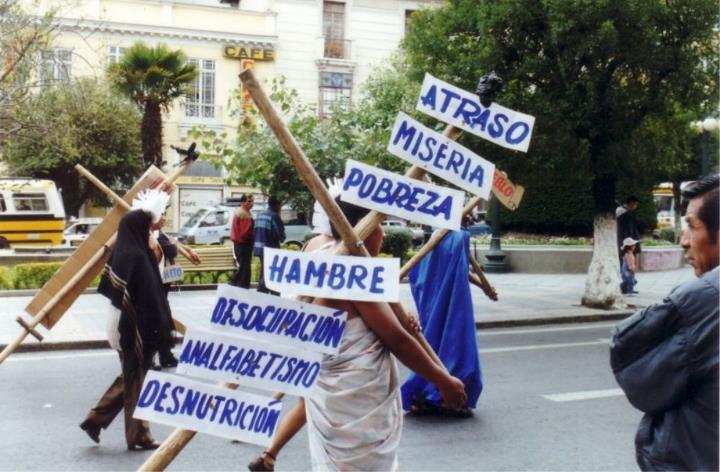

Unbound Social